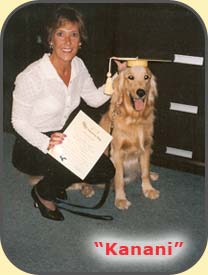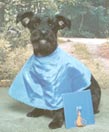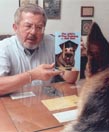FREE Sample: Download our Free Dog Training E-Book Here
FAQ: Happiness is... A Better Canine !
- Can the name you give your dog have an affect on his behavior and temperament?
- What is the hardest dog to train?
What is the smartest dog to train? - What is the best age to start training my dog?
- Can I train my dog simply by reading your book?
- Is it unhealthy for my dog to kiss me?
- Can the name you give your dog have an affect on his behavior and temperament?
-
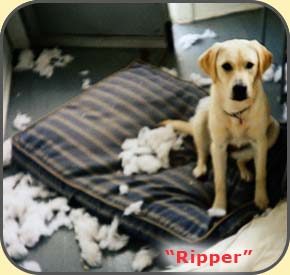
Many times we get calls for “Help! My dog is too aggressive. He wants to eat everybody!” I arrange for an evaluation meeting at the person's home. At the gate, I'm met by a Pit Bull, or a German Shepherd, or Cairn Terrier who wants to eat me alive! The people have to come out to the sidewalk to meet with me. One of my first questions is, “What's the dog's name?” The reply, “Oh, Rocky!” In another instance, “Killer!” And another, “Ripper!” Is it any wonder why these dogs are aggressive? Unbeknownst to the owner, people in general have been making “moves” on that dog since he was a puppy! “Moves” that bring out aggression! Can you picture it?
On the other hand, we have the person who complains, “My Doberman, Shepherd, Rottweiler, etc. is not aggressive at all!” “What's the dog's name?” I ask. “Chrysanthemum!” And another, “Sweet Pea!” And yet another, “Lolly Pop!”
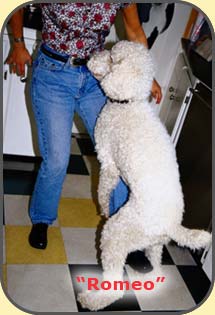
What do you suppose the temperament of the Dalmatian named “Dopey” is like? Dopey belongs to a Mexican family… and family… and family… and family: grandparents, aunts, uncles, cousins, second cousins, etc. Can you imagine the chaos in that household! And who do you suppose is in the center of it all!
And what about “Butkus,” who is an 80 pound Chocolate Labrador Retriever. Butkus belongs to my neighbor, Anita. However, Anita doesn't refer to him as Butkus, as if that wasn't bad enough, she refers to him as, “The dog from hell.” Can you imagine the damage that Butkus has done to Anita's home! And can you imagine the way Butkus greets company - have you ever seen the way that bowling pins scatter when one gets a strike!
Bobbie, owner of a notorious Doberman/Shepherd mix, shared with me that her television cable company serviceman has had “…to come to my home more times to replace wire and remote controls my dog has 'eaten' that they now have a new code in their Service Manual: the code - Rascal!”
One of the looniest situations that I've ever walked into was this loony individual with three of the looniest, unruliest dogs I've ever seen. Their names - Bing-Bing, Bang-Bang, and… Dead Dog!
- What is the hardest dog to train?
What is the smartest dog to train? -
To each of these questions, I reserve a pat-answer: That ... is not ... "the question ...."
Because training dogs entails many variables, no one can guarantee results which are always positive, and no one can - in absolute terms - suggest that one dog is smarter or more trainable than another. Success - is highly dependent on the "smarts" and response ability of the dog - and the master, the temperament of both, follow-through of training methods, and training on a daily basis.
If you have the time and patience, you can train your own dog. There are no magic tricks. Time and patience are of the utmost importance, as are affection, discipline, love, and clear direction; the "acid-test" is - can you muster yourself to a regimen without the structure of a teacher/trainer.
- What is the best age to start training my dog?
-
Before you begin any "official" training - especially if you obtain an older dog - it's best if you first develop a strong and loving bond with him - wait at least two to three weeks. The stronger the bond, the more responsive your dog will be to your training. A supply of lifelong toys will enhance the relationship.
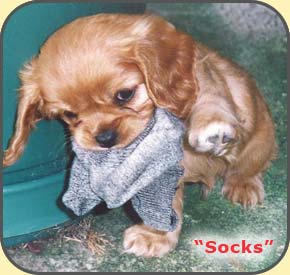
Should "a puppy" be the love that invades your home, formal obedience and behavior training should not commence until your dog is approximately 6-months old. Some may and some should start earlier, especially if yours is of the giant type, but no earlier than 4 months; until this time, the puppy hasn't developed sufficient mature patterns; he lives in a world of Disneyland of all fun and all games; during this time, the emphasis should be socialization, informal training, and the development of his "personality." Formal training prior to the correct age could be a traumatic experience not only for your dog, but for you as well. You will know that the time is right when you begin to wonder, "Just who owns who anyhow?" and begin feeling that the home that you live in is no longer yours!
Housebreaking must start the very moment that "puppy-paws" cross the threshold of your home; do not make any exceptions, do not make any excuses; on this one - do not give an inch!
- Can I train my dog simply by reading your book?
-
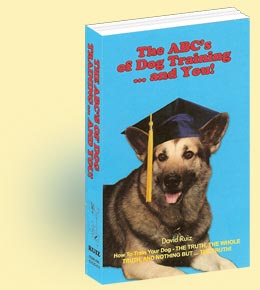
The basis of this book is confidence - for you - the leader of the pack; for if your dog views you in this manner, success can't help but be yours!
By "success" we mean: The teaching of your dog a conduct that will provide both of you with a harmonious life-time together.
When I set out to write this book, my hope was that the readers of it would never again have to resort to any other text in the training, the understanding, the loving and the development of the kind of Master/Dog relations that truly make for each other "The Best of Friends!"
To accomplish the task at hand, it is suggested that you not only read the contents of this book from cover to cover but - chew it, savor it and digest it; there is "filet mignon" to be had! The results to be derived by you and your dog will be ... unparalleled. Throughout this book, the KISS principle applies. Without meaning to offend anyone's intelligence, we use the coined phrase only for emphasis of its valuable intent: "Keep it Simple Stupid" ... "Keep it Short and Simple."
Yes, your dog can be a star - simply by your reading - of this book.
- Is it unhealthy for my dog to kiss me?
-
“My dog's name is Romeo, but when it comes to kisses, he thinks his name is Frenchy. Is this unhealthy?”
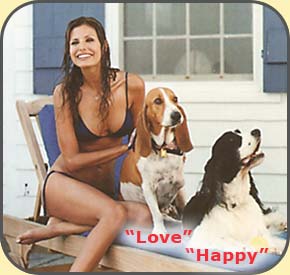
There have been many opinions offered on the subject of "dog kisses" - and none conclusive! In some cases it could be a matter of dominance, and in other cases it could be loving gestures. In other cases, it might be simply because he likes the taste of you, be you sweet, salty, or sour. Bottom line: Of the tens of thousands of dogs and people that I or anybody else have known and trained, I have never heard of a human, or a dog, that was negatively affected or infected - by dog kisses! If the relationship with your dog is the lovey, huggy, kissy-type and you don't mind dog kisses - go for it; but I would also suggest that you have assured yourself of your dog's overall good health. If you don't like kisses from your dog, simply - break him of it - the same that you would do with a human.
